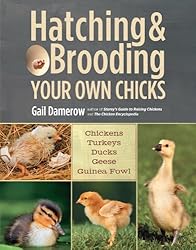
As an Amazon Associate, I earn from qualifying purchases.
To continue “Chicken Week” on the blog, I wanted to write about Hatching & Brooding Your Own Chicks by Gail Damerow. I read this book last spring as part of a Pastured Poultry course I took through the UMass Amherst Stockbridge School of Agriculture. For the class, we also read Harvey Ussery’s The Small-Scale Poultry Flock and Joel Salatin’s Pastured Poultry Profit$, both of which I reviewed previously. These three books together provide an excellent starting point for keeping chickens and other fowl. Damerow’s book stands out because of its focus on hatching and brooding particularly and its colorful photographs and tables.

Damerow is also the author of Storey’s Guide to Raising Chickens, The Chicken Encyclopedia, The Backyard Homestead Guide to Raising Farm Animals, and most recently – The Chicken Health Handbook. Damerow explains that her first chickens were grown-up hens that came with her house, but she quickly added some chicks and then began hatching her own. Interestingly, the book is organized from chicks to eggs because Damerow says that commonly people start their flock by buying chicks at a local store or online and then later learn about hatching and brooding. She also hopes readers will be less intimidated by the egg hatching process once they’ve already had a chance to raise chickens or other adult fowl. So, there are two parts to the book:
Part 1 – The Chicks:
- Acquiring your first chicks (chickens, turkeys, ducks, geese, and guinea fowl)
- Setting up the brooder (including ready-made and homemade brooders)
- Managing water, feed, and bedding
- What to expect as chicks grow
- Hatchling health issues (including contagious diseases, physical defects, and environmental sickness)
Part 2 – The Eggs:
- The broody hen
- Selecting an incubator (including detailed information about airflow, temperature, and humidity control)
- Eggs for hatching (including egg selection, candling, and storage)
- Operating an incubator (including adjusting temperature, humidity, and ventilation)
- What went wrong (including record keeping, troubleshooting hatching issues, and a table of hatching problems related to breeder nutrition)
- Hatchling identification
Why might you hatch, rather than buy chicks?
Damerow gives several reasons why you may prefer to hatch your own chicks in an incubator. Hatching your own chicks can help you to build a sustainable, local flock and/or to restore an endangered breed. An incubator may be helpful if you have pets or other animals, which might disturb the eggs in a hen’s nest, or if the breed of chickens you raise are not strong setters. Keep in mind – if your hens are hatching eggs, then they will not lay eggs. So if you want them to keep laying, try an incubator! Damerow explains that sometimes she lets her hens set, other times she uses an incubator (such as when she needs a large number of chicks), and other times she does both in combination (such as if a setting hen leaves the nest early or gets killed by a predator before the eggs hatch).
As I mentioned earlier, the colorful photographs in the book really stand out. Raising healthy chicks requires attention to detail (for example, setting up an incubator successfully to ensure appropriate airflow, temperature, and humidity), so I really appreciated the photos of different supplies you can use (e.g., feeders, drinkers, bedding, brooders, and lighting), hatchling health issues, and incubator components. There is also a helpful series of photos showing eggs in different stages of incubation for 21 days. This will be my go-to book for hatching and brooding chicks for years to come.
Check out this list to see all the chicken books I’ve reviewed.
Click here to visit our Amazon store, which includes lists of things chickens need, as well as our favorite chicken books!
Janie Hynson is an aspiring homesteader in North Carolina. She recently moved back to her hometown after living in Boston for six years and then traveling across the U.S. working on organic farms. Janie works in public health and sustainable agriculture and is interested in how health can be improved through homesteading.




My son use to hatch chicks and raise them when he was young. He can do it again now that he is married and has a place of his own. This book would be helpful.
We have lost lots of chicken the past 6 months – time to try to hatch some- perfect timing AND Homeschool project- this would be so informative and helpful !
I work amoung a poor indiginous tribal group in S. America, and I partner with a worker who is in the early years of a chicken microloan program. She incubates native chicken eggs and we will be joining her in this project. Winning this book would help us in this venture. (I am stateside until summer.) Thanks for consideration.
This sounds like a great resource!
This would be a great help to this new chicken grower!
Hello!
The rafflecopter link to your blog, as well as the “I commented “(on your blog) key appear to be not working,